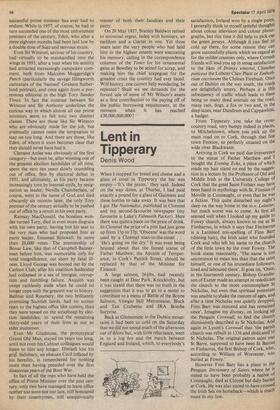Lent in Tipperary
Denis Wood
When I stopped for bread and cheese apd a glass of stout in Tipperary the bar was empty—'It's the prices,' they said. Indeed on the way down, at Thurles, I had paid exactly a pound for a glass of Guinness and three bottles to take away. It was here that I got The Nationalist, published in Clonmel and my second-favourite newspaper (my favourite is Lake's Falmouth Packet). Here there was quite a piece on the price of drink. In Clonmel the price of a pint had just gone up from 33p to 37p. 'Obscene' was the word used by a Clonmel man-in-the-street . . . `He's going on the dry.' It was even being bruited about that the famed statue of Father Matthew, the Apostle of Temperance, in Cork's Patrick Street, should be replaced by that of the Minister for Finance.
A large salmon, 26-ilbs, had recently been caught at Deer Park, Knocklofty, but it was stated that there was no truth in the suggestion that it was to go to a motel to contribute to a menu of Battle of the Boyne Salmon, Vinegar Hill Mayonnaise, Black and Tan Crubeens and IRA Bombe Surprise.
Back at Glenasmole in the Dublin mountains it had been so cold on the Saturday that we did not spend much of the afternoon out of doors but, with little reluctance, went in to a log fire and the match between England and Ireland, which, to everybody's
satisfaction, Ireland won by a single point. I generally think to myself spiteful thoughts about colour television and colour photographs, but this time it did help to pick out the green jerseys. Although it can feel so cold up there, for some reason they can grow successfully plants which we regard as for the milder counties only, where Cornish friends will lead you up in smug satisfaction to the likes of Drimys winterei, Clianthus puniceus the Lobster Claw Plant or Embothrium coccineum the Chilean Firebush. Once out of Dublin on the way south, the road are delightfully empty. Perhaps it is this infrequency of traffic which leads to there being so many dead animals on the road, many cats, dogs, a fox or two and, in the deep lanes, near Dundrum and Cappawhite, a badger.
From Tipperary you take the crosscountry road, very bumpy indeed in places, to Mitchelstown, where you pick up the main road on to Cork, through that fine town Fermoy, so perfectly situated on the wide river Blackwater.
Arriving in Cork we paid due irreverence to the statue of Father Matthew and I bought the Evening Echo, a piece of which made my hair stand on end by the suggestion in a lecture by the Professor of Old and Middle Irish at the University College of Cork that the great Saint Finbarr may have been fused in mythology with St. Finnian of Moville in Connaught, or even that he was a fiction. This quite disturbed my night's sleep on the way home in the m.v. Leinster, but much worse was to come. At first all seemed well when I looked up my guide to Fowey church, always known to me as St Fimbarrus, in which it says that Fimbarrus is a Latinised mis-spelling of Finn Barr (shining hair), the Irish saint who founded Cork and who left his name to the church of the little town by the river Fowey. The book states reasonably, 'The name is too uncommon to mean less than that the saint himself, or one of his immediate followers, lived and laboured there'. It goes on, 'Once, in the fourteenth century, Bishop Grandisson of Exeter made an attempt to rededicate the church to the more commonplace St Nicholas, but even that spiritual potentate was unable to shake the custom of ages, and after a time Nicholas was quietly dropped, Finn Barr was restored and has remained since'. Imagine my dismay, on looking up the Penguin Cornwall, to find the church dismissively described as St Nicholas. And again in Lyson's Cornwall that 'the parish church was rebuilt in 1336 and dedicated to St Nicholas. The original patron saint was St Barre, supposed to have been St Barrus or Finbarrus, the first Bishop of Cork, who, according to William of Worcester, was buried at Fowey.'
However Finn Barr has a place in the Penguin Dictionary of Saints where he is stated to have been probably a native of Connaught, died at Cloyne but duly burled, at Cork. He was also stated to have crossed the Irish Sea on horseback—which is much more in my line.


































 Previous page
Previous page